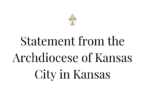
Worshippers pray during Mass in 2017 at St. George Chaldean Catholic church in Tel Esqof, Iraq, which was damaged by Islamic State militants. Iraqi Catholic leaders are urging Christians to remain steadfast in this Lenten season as they encounter challenges of Islamic State’s legacy in their historic lands. (CNS photo/Marko Djurica, Reuters)
by Dale Gavlak
AMMAN, Jordan (CNS) — Iraqi Catholic leaders are urging Christians to remain steadfast in this Lenten season as they encounter challenges of the so-called Islamic State’s legacy in their historic lands.
In a Lenten pastoral letter, Chaldean Catholic Patriarch Louis Sako of Baghdad urged Iraqi Christians to pursue unity with other Christians at this sacred time with “open hearts.”
“Many Christians today live in a crisis of faith and intellect because of the circumstances of war, instability, migration and the dominance of social media on the details of their daily lives,” he wrote in the letter, released Feb. 21.
Many Chaldean Catholics lost their homes, properties and other possessions as they fled the so-called Islamic State militants in the summer of 2014. Many are destitute, still living in camps for the internally displaced or sheltering abroad.
“However, these challenges should not discourage their determination and dissuade them from renewing their faith and deepening it, to witness of the Lord and his church,” the patriarch said, calling on Christians to “increase within themselves strength, confidence and enthusiasm.”
Patriarch Sako also repeated his appeal to fellow Iraqis from different religious backgrounds to recognize Christians as “part of the national fabric of Iraq and to stop their decline, for Christians have had a historical presence in this country, where they have a role and a message.”
Chaldean Catholic Archbishop Yousif Mirkis of Kirkuk and Sulaimaniyah estimates that between “40-45 percent of the Christians have returned to the some of their ancestral villages, particularly Qaraqosh.”
But he and other Catholic leaders told Catholic News Service there are many challenges to those Christians hoping to return home after the Islamic State occupation and expulsion.
“There are problems with Bartella. Although Bartella is not far from Qaraqosh, the Shiites have been imposing themselves and using the force of Iran to take over territory, etc. The Christians of Bartella are very upset by this situation,” Archbishop Mirkis told CNS by phone.
“Maybe the Americans and Baghdad government are not very aware of what is happening in these villages,” he said.
“The Christians of Bartella tell me: ‘We cannot go back. We don’t dare to go back.’ So, these people are still sheltering in Irbil or in the camps for internally displaced people in Kirkuk and Sulaimaniyah,” Archbishop Mirkis said of the northern Iraqi cities providing Christians with refuge.
“Qaraqosh is a little bit better. There, houses are being repaired. Now, the people are returning, but many houses are burned and are completely destroyed. These Christians cannot afford the prices to reconstruct the houses,” he said.
The archbishop and his dioceses have been helping displaced Christians with material and spiritual support as well as providing transportation for hundreds of their university students. Many Christian supporters claim Christian organizations have been the sole sponsors of reconstruction efforts, without help from the government.
But Father Emanuel Youkhana told CNS that so far, the planned “return, reconstruction and rebuilding movement did not meet our expectations and hopes. Thousands of families are hesitating and/or unable to return, and they are still displaced in Kurdistan.”
The archimandrite, a member of the Assyrian Church of the East, heads the Christian Aid Program Northern Iraq, CAPNI. He spoke to CNS by phone and email.






